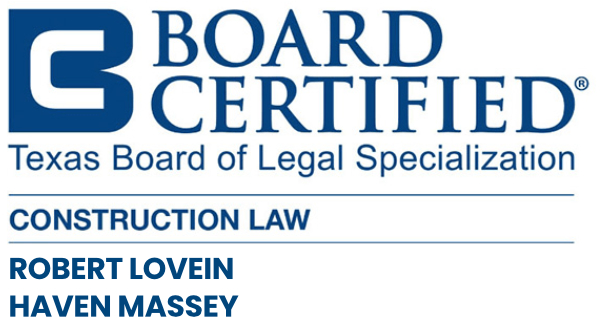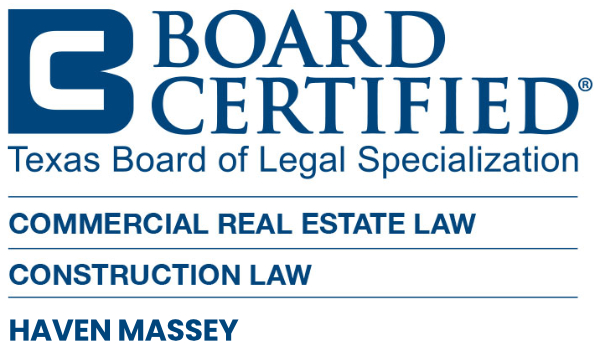The Texas Board of Legal Specialization has certified approximately 150 Texas lawyers as Board Certified in Construction Law. Lovein Ribman’s construction law department is overseen by two of those Board Certified lawyers that are experts in Texas lien laws. We represent every trade in the industry, from earthwork contractors, concrete contractors, HVAC contractors, steel fabricators, masonry suppliers and installers, electricians, structural repair contractors, plumbers, truss manufacturers, roofers, painters, commercial glass fabricators and installers, fire suppression contractors, and so on . . . We counsel and represent property owners, architects, engineers, developers, sureties, general contractors, subcontractors, and suppliers with every type of legal issue encountered on commercial, industrial, residential and public construction projects or through running a construction-related business. Our construction attorneys have been tried and tested, and are experienced in all aspects of construction law, to include enforcing payment through the mechanics lien and bond claim process; foreclosure actions; defending and/or prosecuting design claims, defect claims, and delay damage claims; and with drafting, reviewing, and modifying all types of residential and commercial contracts. We understand your industry. We listen to your needs. We will add value to your company.
The Mechanic’s Lien Process – How to File a Mechanic’s Lien in Texas
What are the Benefits to Filing a Lien?
How Long Should I Wait Before I Begin the Lien Process on a Project?
What are the Steps for Filing a Mechanic’s Lien?
What is the Deadline to Serve a Pre-Lien Notice?
What Is the Deadline for Filing a Lien?
The Mechanic’s Lien Process – How to File a Mechanic’s Lien in Texas
We have filed tens of thousands of mechanic’s liens for our clients in nearly every county across the entire state of Texas. Based on our experience, we believe that there is nothing stronger that a contractor can do to secure payment of its unpaid invoices than invoke the lien process. The key is to begin the process early and retain a Board Certified Construction Lawyer to assist you. If you are looking to serve a Pre-Lien Notice, file a Lien, or to foreclose a Lien, please contact us for a no obligation consultation by calling (888) 368-2483 or by submitting the form below. Read below to learn more about the lien process and the statutory deadlines.
What is a Mechanic’s Lien?
A Mechanic’s Lien is one of the most powerful legal tools that a General Contractor, Subcontractor, Architect, Engineer, Material Supplier, or Laborer has to secure payment for unpaid labor/materials/equipment provided to a privately owned (as opposed to state or federally owned) Property. In Texas, a Mechanic’s Lien is also referred to as a “Contractor’s Lien.” When properly filed with the County Clerk’s Office in the county where the Property is located, the Lien creates an encumbrance (or a “cloud”) on the Property’s title, thereby giving notice to Lenders and potential purchasers that someone (referred to as the “Claimant”) claims a debt is owed to it for labor/materials/equipment provided to the Property. Lenders typically will not provide permanent financing nor will they refinance a Property that has a Lien filed against it. As such, Property Owners (especially on new construction) will need to resolve the Lien prior to completion of the Project or before the Property is refinanced or sold. Further, if the debt is not paid, you may enforce the Lien by filing a Lawsuit to foreclose (sell) the Property. It has become the practice, as opposed to the exception, for all categories of Contractors, Subcontractors, Architects, Engineers, Material Suppliers, and Laborers to routinely serve and file all necessary Lien Documents as a means to protect their unpaid invoices.
What are the Benefits to Filing a Lien?
A Lien creates a new and additional source to recover payment of the debt. For example, in the event of nonpayment, your first line of recovery would typically be a breach of contract claim against the party who hired you. However, if you timely and properly file a Lien against the Property, then you will have the following additional rights and protections: (1) to file a Lawsuit to foreclose on the Lien and force a sale of the Property; (2) a Lien against any funds held by the Property Owner and due to the General Contractor; (3) the right to be paid directly by the Property Owner if the General Contractor does not timely dispute the amount owed in writing; and (4) if the Property Owner pays the General Contractor after receiving a timely Pre-Lien Notice (with “fund trapping” language), then the potential right to force the Property Owner to pay twice for your work. The “Lien Process” is also an excellent way to gain leverage in negotiating a resolution of the debt. Moreover, if you file a Lawsuit and prevail on foreclosing on the Lien on a commercial project, then you are entitled to recover all reasonable attorneys’ fees and costs.
How Long Should I Wait Before I Begin the Lien Process on a Project?
One of the most common mistakes made is to assume that you will be paid for your work. The better approach is to assume that you will not be paid and to make it a business practice to timely serve all Pre-Lien Notices and file your Lien Affidavits well before your deadlines. Remember, a Pre-Lien Notice does not need to be an adversarial demand for payment, but instead can be drafted in a manner that simply informs the Property Owner and the General Contractor that there is an unpaid balance owed and that the Notice is being sent to comply with the mandatory Texas Lien Statutes.
What are the Steps for Filing a Mechanic’s Lien?
The mandatory steps to perfect a Mechanic’s Lien against either a residential or commercial property include: (1) serving the Property Owner and General Contractor with a Pre-Lien Notice if you were not hired by the Property Owner or the Property Owner’s agent (you are not required to serve a pre-lien notice if hired by the Property Owner); (2) file a Lien Affidavit with the County Clerk’s Office; (3) serve the Lien Affidavit on the Property Owner and the General Contractor. To increase the probability of being paid, the Lien Affidavit should be sent as an enclosure to a strong Payment Demand Letter that addresses the Texas Trust Fund Statute, the Texas Prompt Payment Act, and possibly the Deceptive Trade Practices Act.
What is the Deadline to Serve a Pre-Lien Notice?
If you were hired by the Property Owner or the Property Owner’s Agent, then you are not required to serve a Pre-Lien Notice before filing a Lien.
- Commercial Projects: If you were hired by the General Contractor, then you must serve the Property Owner and the General Contractor with a Pre-Lien Notice by no later than the 15th day of the third month, for each and every month that you provide unpaid labor or materials to the Project. Subcontractors and/or Material Suppliers hired by a Subcontractor (also known as Second-Tier Subcontractors) are required to serve an additional Pre-Lien Notice to the General Contractor by no later than the 15th day of the second month from providing unpaid labor/material to the Project before serving the above notice. However, these two notices can be combined into one notice if served by the earlier of the two dates.
- Residential Projects: If you were hired by the General Contractor, then you must serve the Property Owner and the General Contractor with a Pre-Lien Notice by no later than the 15th day of the second month, for each and every month that you provide unpaid labor or materials to the Project.
What Is the Deadline for Filing a Lien?
- Commercial Projects: At the very latest, the Lien Affidavit must be filed with the County Clerk’s Office in the county where the Property is located by no later than the 15th day of the fourth calendar month from when the contract is terminated in writing, has been completed, finally settled, or abandoned.
- Residential Projects: At the very latest, the Lien Affidavit must be filed with the County Clerk’s Office in the county where the Property is located by no later than the 15th day of the third calendar month from when the contract is terminated in writing, has been completed, finally settled, or abandoned.
- Exception: If you were hired by the Property Owner and performed work on the structure, then you may be entitled to a Constitutional Lien which can be filed up to four years from the date that you completed the work.
















